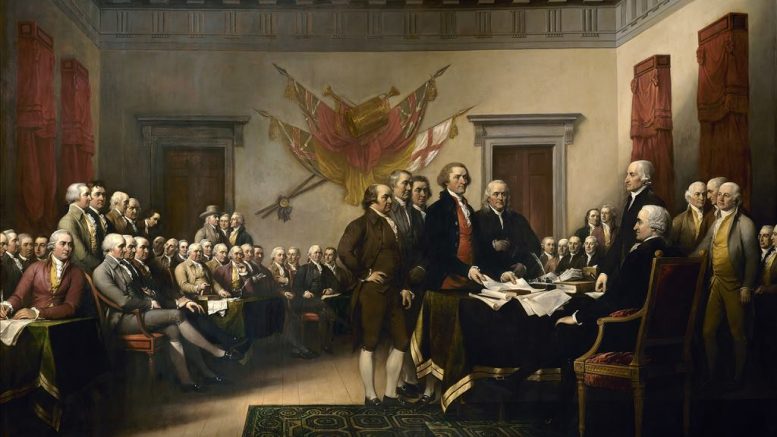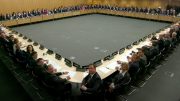The US president’s promise to ‘put America first’ has already put paid to any special treatment for Britain on trade, writes Geoff Kitney.
Of all the optimistic claims made about the prospects for Brexit Britain the one that already appears demonstrably untrue is that Donald Trump would be a friend of Britain on trade.
The United States president encouraged those hopes by declaring his support for Brexit with a promise to give priority to a free trade agreement (FTA) with the UK ahead of the one already being negotiated with the European Union (EU).
It seemed at the time to be a dubious promise, given that his core promise to Americans was to “Put America First”.
Bilateral trade deals are dead before negotiations begin if one of the parties declares that they will insist on all advantages and no disadvantages for their side.
Now the reality of Trump’s intentions is becoming clear. He is no-one’s friend on trade.
In fact, he appears likely to become everyone’s enemy.
Reports out of Washington DC of the first major Trump administration consideration of trade policy are alarming. They indicate that Trump is utterly determined to apply his America First policy to trade, regardless of the consequences for the rest of the world – and regardless of the facts.
In trade politics, there is always a lot of bluff and counter-bluff. The hope about Trump’s approach to trade was that, once he became president, he would face overwhelming pressure from the other members of his administration to recognise the dangers of a sudden retreat into protectionism.
The expert view was that Trump simply did not understand how trade policy works and how it requires give and take – that is, that it would be folly to try to restore jobs to industries where it would be impossible to gain a competitive advantage without applying seriously distorting and damaging tariffs.
That didn’t work on the issue of America’s membership of the Trans-Pacific Trade Agreement (TPPA). One of his first executive orders – even before he formed his administration – was to withdraw the US from the TPPA.
Trump is now preparing to put his beliefs into action, with the announcement of the imposition of a whopping tariff on steel imports just days away
It now appears from credible reports that Trump is utterly unpersuadable and the dangers are that he will resort to protectionism. Views that he has held since his earliest days in business about the unfairness of other countries towards the US on trade seem deeply entrenched.
Trump is now preparing to put his beliefs into action, with the announcement of the imposition of a whopping tariff on steel imports just days away.
Such a move would almost certainly be the opening salvo in a new trade war, the global consequences of which are potentially dire.
The risk is that this will see global trade slide into a dog-eat-dog battle of tariffs and quotas that would see the rules-based system under the jurisdiction of the World Trade Organization (WTO) become ineffectual.
The dangers that this poses are certain to be a major issue at this week’s meeting in Germany of the leaders of the Group of Twenty (G20) major world economies.
The meeting was already looking difficult, as a result of Trump’s “Put America First” decision to pull the US out of the Paris Agreement on Climate Change.
The global threat this poses in the medium to long term is dire.
But the trade threat is immediate – and it is likely to cause severe tensions around the table in Hamburg on July 6 and 7.
The challenge facing the rest of the world is to work out a way of explaining to Trump the basic facts of global trade.
But Trump seems impervious to rational argument.
Trump is utterly determined to apply his America First policy to trade, regardless of the consequences for the rest of the world – and regardless of the facts.
Trade is said to be the one issue relevant to his role as US president on which he has had a long-term interest.
In trade circles, officials talk about a video of a television interview Trump did in his early 20s, as he was emerging as a big player in US real estate, in which he declared that, if he ever had the power, he would impose barriers to help protect American industries from the unfair competition which he believed were costing US workers their jobs.
Nothing seems to have changed in the intervening 50 years, despite the fact that over that time the US economy has grown almost continuously and remains among the global economic leaders.
Unemployment in the US is at long-term lows.
Alarmingly, despite the fact that it is said to be the one policy area in which he has a long-held interest, Trump remains gobsmackingly ignorant.
At a meeting with the new South Korean president a few days ago, Trump revealed his ignorance by declaring that the US’s massive trade deficit to the rest of the world was the reason the US had a $20 trillion national debt.
The statement confused the US’s trade account with US fiscal policy, a basic misunderstanding. As one commentator put it, by making such a basic error, Trump was showing he was not fit to be making decisions about either trade policy or managing the government’s budget.
But the fact is that the US political system gives the President tremendous power to make unilateral decisions on trade.
Laws introduced to give the president the power to fast-track trade decisions – introduced with the intention of facilitating trade between the US and its trading partners – give Trump the power to carry out his threats to declare a trade war against the US’s major trading partners, in particular China, Japan, the European Union – and Britain.
US reports indicate that Trump’s hand-picked cabinet is opposed to his trade war plans and some analysts believe they may still be able to persuade him to pull back from the brink.
But given that his promise to put American workers first was his most loudly trumpeted promise on the way to winning the presidency, such hopes seem overly optimistic.
In the global fallout that is likely to follow any US moves to engage in a trade war, the free-trade future that is a key to Brexit Britain’s success appears certain to be unattainable.





